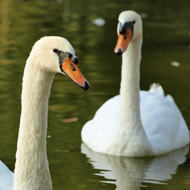Lead poisoning kills 'up to 100,000 birds'

For migratory swans, lead poisoning accounts for a quarter of all recorded deaths.
As many as 100,000 of the UK's swans, ducks and geese are estimated to die from lead poisoning every year, according to a new report.
Scientists and wildlife charities are calling for lead ammunition to be phased out by the end of 2017 and replaced with non-toxic alternatives, which are readily available.
The report was released as part of a symposium on the risks of lead ammunition, which was held at the University of Oxford. It includes research from the Wildfowl & Wetlands Trust (WWT) and the RSPB.
In the UK, at least 2,000 tonnes of lead shot pellets are used to shoot live quarry each year. Much of this is irretrievable and remains on the ground for birds to ingest, mistaking it for seed or grit.
Another 3,000 tonnes of lead shot is deposited on clay shooting grounds.
The research shows that for migratory swans, lead poisoning accounts for a quarter of all recorded deaths. Large numbers of terrestrial birds are also thought to die in this way.
A recent study also found that 77 per cent of locally shot ducks bought from suppliers in England were illegally killed using lead.
As well as harming wildfowl, lead from ammunition can also enter the human food chain via wild-shot game meat. As lead ammunition passes through an animal it breaks into fragments that are often too small to be seen or cut out.
According to the new figures 4,000-8,000 children a year are at risk of at least a one-point reduction in their IQ. Children and pregnant women are particularly vulnerable to the toxic effects of lead.
WWT's chief executive Martin Spray said voluntary and partial restrictions on the use of lead "have not worked", which leaves only one option - to phase out lead ammunition.
"You can’t deny the clear and powerful narrative of hundreds of research papers and the consensus of scientists from around the world who agree lead is a poison, its use in ammunition presents significant risks, and that exposure to it should be minimised," he argued.



 The BSAVA has opened submissions for the BSAVA Clinical Research Abstracts 2026.
The BSAVA has opened submissions for the BSAVA Clinical Research Abstracts 2026.